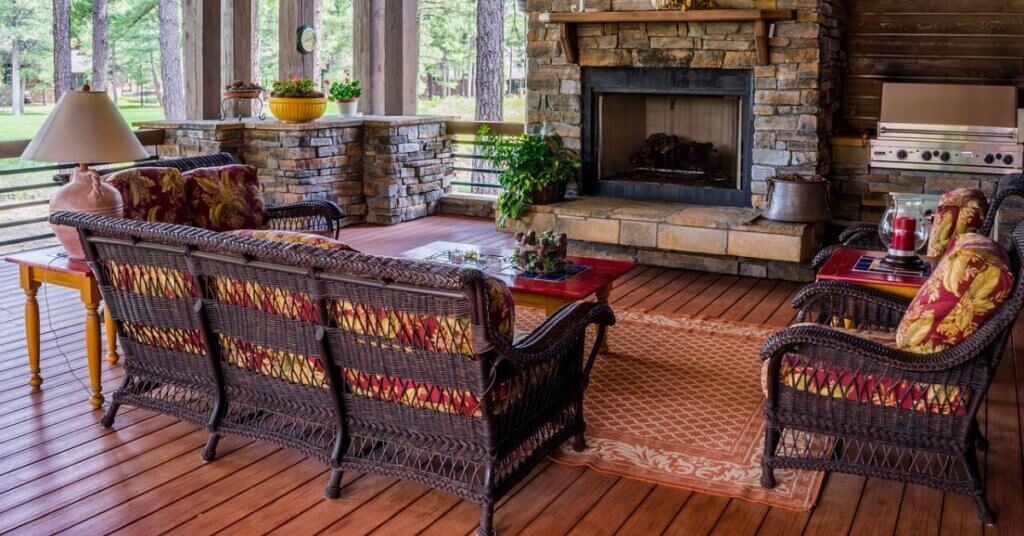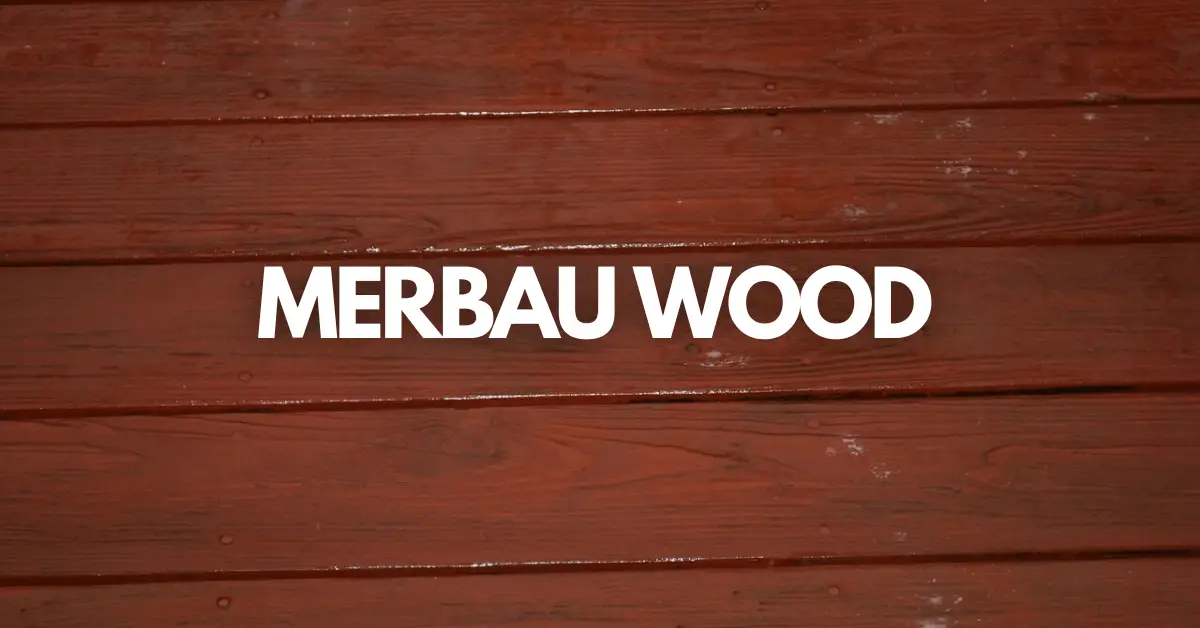What is Merbau Wood?
Merbau Wood is a dense, durable, and strong hardwood native to the Indo-Pacific. It is one of the most popular woods for making furniture and decks.
Where does Merbau wood come from?
Merbau wood comes from the large-sized Merbau tree. It is native to Southeast Asia, especially Indonesia, Malaysia, and the Philippines. The Merbau tree typically grows in tropical rainforests. Natives use the bark and leaves for traditional medicine.
Merbau Wood Characteristics
| Scientific name | Intsia spp. (I. bijuga, I. palembanica) |
| Tree Size | 100-200 ft (30-60 m) tall, 4-5 ft (1.2-1.5 m) trunk diameter |
| Janka Hardness | Janka Hardness: 1,840 lbf (7,620 N) |
| Average Dried Weight | 51 lbs/ft3 (815 kg/m3) |
| Elastic Modulus: | 2,310,000 lbf/in2 (15.93 GPa) |
| Crushing Strength: | 10,650 lbf/in2 (73.4 MPa) |
| Shrinkage: Radial: | 2.9%, Tangential: 4.8%, Volumetric: 8.0%, T/R Ratio: 1.7 |
| Rot-Resistant | Very resistant to rot |
| Type | Hardwood |
Common Uses of Merbau Wood
Merbau wood is used for flooring, decks, furniture, turned objects, and other specialty wood items. Wood has excellent strength, so it is used where strength and durability are required.
It is also an excellent tonewood. It is used in musical instruments for strong bass with notable sustain. It is used for electric, acoustic, and classical guitar construction.
Is Merbau Wood Good for Decking?
Merbau wood is an excellent choice for durable decks because it is very durable and naturally resistant to rot and insects. Even after being in contact with the ground, it remains durable for many decades with minimal maintenance.
Another main reason why Merbau Wood is a good choice for decking is that it is less prone to Splitting or Cracking.
Merbau wood Flooring
Merbau wood is one of the excellent choices for making durable and stable flooring. Its density and hardness make it less affected by dents and scratches. But to keep the wooden floor durable for a long time, it is necessary to maintain it regularly.
Is Merbau Wood Good For Outdoor Uses?
Yes, Merbau wood is highly suitable for all types of outdoor uses due to its natural durability and resistance to weathering. It can withstand extreme weather conditions such as humidity, rain, and UV exposure.
Appearance
Heartwood ranges in color from light brown to dark reddish-brown. But it is orange-brown when freshly cut, turning dark brown as the wood dries. The sapwood is lighter in color than the heartwood and can be easily distinguished.
Merbau wood has a straight to interlocked grain with a natural luster. It has large open pores.
Working with Merbau Wood
Generally, Merbau wood is easy to work with, but due to its moderate density, it is hard to work with hand tools. Glues, stain, and finish well.
When working with Merbau wood, skin irritation, and runny nose are common problems that can occur. That’s why you should take the necessary precautions.

Merbau Wood Advantages and Disadvantages
Merbau is a great wood species, but it has advantages and disadvantages that you should know before using it.
Advantages
Appearance
Merbau wood looks beautiful with or without finishing. It has a dark brown color with small yellow mineral deposits, which makes it unique from other woods.
Durable and Strong
Merbau is known for its extreme durability, with an average timber lifespan of 40 to 50 years, while Merbau decking is durable for 20 to 25 years under low maintenance.
Rot-resistant
Merbau wood is naturally rot, weather, and insect-resistant. Wood contains natural oil, which protects the wood from external elements.
Low maintenance
One of the reasons why Merbau wood is preferred is that Merbau requires less maintenance than other woods. Where other outdoor applications require maintenance every 6 to 8 months, Merbau requires maintenance once every 12 months.
Disadvantages
Expensive
Merbau is an expensive and popular wood, as it is one of the most demanding species for decking. There are many other decking materials or wood species on the market which are cheaper than Merbau. That’s why many homeowners have other better options.
Workability
Working with Merbau is difficult because it has a high density and interlocked grain. Wood is difficult to saw.
Fade over time
Merbau’s beautiful dark brown color turns gray over time. To prevent this, the Merbau should be oiled or sealed.
Merbau Wood Cost
Generally, Merbau is an expensive hardwood, and the price of wood depends on many factors, like wood quality, location, and availability of limber.
Merbau wood is one of the most popular lumber, often imported from other countries. Merbau wood has increased significantly in cost over the past few decades.
How Hard is Merbau Wood?
Merbau is a medium-density hardwood with a Janka hardness value of 1,840 lbf (7,620 N). It is harder than many hardwoods and more resistant to wear and damage. Its toughness makes it suitable for outdoor use.
Janka hardness test measures the resistance of wood to denting and wear.
Here are other popular wood Janka hardness values to give you an idea of how hard Merbau is.
| Wood Species | Janka Hardness Value |
| Wenge Wood | 1,930 lbf (8,600 N) |
| Pecan Wood | 1,820 lbf (8,100 N) |
| Merbau Wood | 1,840 lbf (7,620 N) |
| Apple Wood | 1,730 lbf (7,700 N) |
| Black Locust Wood | 1,700 lbf (7,560 N) |
| Black Alder Wood | 650 lbf (2,890 N) |
Is Merbau Wood Waterproof?
Merbau is more resistant to water and weather than many other hardwoods. But Merbau is not waterproof. Paint or exterior finishing seals the open pores or creates a protecting layer, so the wood does not absorb moisture.
Is Merbau Wood Termite Resistant?
Merbau wood is naturally resistant to most termites because of a complex chemical compound or oil in the wood. These natural compounds make Merbau wood less attractive to termites and may help protect it from insect attack.
How to Care for Merbau Decking?
Although Merbau is a robust hardwood, maintenance is required to keep the deck durable and looking the best.
Here are some simple steps for maintaining Merbau decking.
- Clean your deck regularly: Sweep it regularly to remove dirt and moisture, and use a hose to wash it down.
- Use a wood cleaner: To remove stains and dirt that a hose cannot remove, use a wood cleaner specifically designed for decking. Follow the directions on the label.
- Sand rough areas: If your deck becomes rough or splintered over time, use medium-grit sandpaper to smooth the surface.
- Protect the wood: To prevent fading and weathering, apply a wood sealer or finish to your deck. This process will also help to protect the wood from moisture and rot.
- Repair damaged areas: If you notice any areas of your deck that are damaged or showing signs of wear, repair them as soon as possible to prevent the damage from spreading. It may require replacing or repairing individual boards.
Is Merbau Wood Sustainable?
Yes, Merbau wood is sustainable. It is not listed in the CITES Appendices but is on the IUCN Red List. The population of Merbau has decreased by about 20 percent.
Conclusion
Merbau wood is a versatile and durable material popular for use in furniture, flooring, and decking. It has a distinctive appearance with interlocking grains. Merbau has natural properties that make it suitable for use in various outdoor and high-moisture environments.

